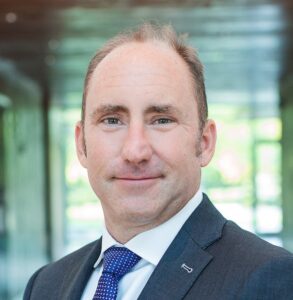Writer: Joey Garrand
 4 min read October 2021— From providers of fitness, nutrition and social engagement solutions to hospital systems, every healthcare company has experienced some form of evolution throughout the pandemic. In speaking with Invest:, two of Nashville’s healthcare giants, Richard Ashworth, president and CEO of Tivity Health, and Marty Bonick, president and CEO of Ardent Health Services, discussed the acceleration of digital transformation in healthcare as well as what makes Nashville a great region to be headquartered within.
4 min read October 2021— From providers of fitness, nutrition and social engagement solutions to hospital systems, every healthcare company has experienced some form of evolution throughout the pandemic. In speaking with Invest:, two of Nashville’s healthcare giants, Richard Ashworth, president and CEO of Tivity Health, and Marty Bonick, president and CEO of Ardent Health Services, discussed the acceleration of digital transformation in healthcare as well as what makes Nashville a great region to be headquartered within.
What makes Nashville a great market for your headquarters?
 Richard Ashworth: The innovation hub for healthcare is Middle Tennessee. If you’re doing anything to advance the healthcare industry, you’re going to want to look at what’s happening in Nashville. There’s also a lot of money here and that’s important because as you look to invest, try new things, launch pilots and foster partnerships, there’s almost $50 billion sitting right in Nashville to help fund those initiatives. In addition, there are a couple hundred thousand jobs within the local community that are all about healthcare. When you put all those things together, being focused on innovation, having the money and having the people, that makes us proud to be here and part of the region’s story.
Richard Ashworth: The innovation hub for healthcare is Middle Tennessee. If you’re doing anything to advance the healthcare industry, you’re going to want to look at what’s happening in Nashville. There’s also a lot of money here and that’s important because as you look to invest, try new things, launch pilots and foster partnerships, there’s almost $50 billion sitting right in Nashville to help fund those initiatives. In addition, there are a couple hundred thousand jobs within the local community that are all about healthcare. When you put all those things together, being focused on innovation, having the money and having the people, that makes us proud to be here and part of the region’s story.
 Marty Bonick: Beyond the healthcare ecosystem that Nashville offers, this is a vibrant, multidimensional city. It’s one of the fastest-growing markets in the country and is receiving a lot of attention. We have a lot of amenities, from major league sports to great educational institutions to a blooming arts and culture scene. While traffic is always a topic of conversation, it’s still nothing like in Dallas, Chicago, New York, or Atlanta. We’re growing but this is still a very manageable city. It is so accessible, you can get almost anywhere within 10 to 15 minutes. Nashville is also a very supportive community. We still embrace Southern hospitality and those values continue to guide our business principles. All of this makes Nashville a great location where families want to live and corporations want their headquarters to be located.
Marty Bonick: Beyond the healthcare ecosystem that Nashville offers, this is a vibrant, multidimensional city. It’s one of the fastest-growing markets in the country and is receiving a lot of attention. We have a lot of amenities, from major league sports to great educational institutions to a blooming arts and culture scene. While traffic is always a topic of conversation, it’s still nothing like in Dallas, Chicago, New York, or Atlanta. We’re growing but this is still a very manageable city. It is so accessible, you can get almost anywhere within 10 to 15 minutes. Nashville is also a very supportive community. We still embrace Southern hospitality and those values continue to guide our business principles. All of this makes Nashville a great location where families want to live and corporations want their headquarters to be located.
What does the balance between physical and digital offerings look like moving forward?
Ashworth: Our research shows that 84% of those who are using digital offerings with us today want to go back to the gym, and they plan to use both digital and physical offerings moving forward. Hybrid is not just for cars; it’s part of our future. Almost 70% of our seniors have used live video calling and streaming either for friends or medical appointments. We all knew this shift was coming, but this already existing trend was exacerbated by COVID and we have a huge opportunity to continue this momentum and reach seniors where they are. However, this comes with its challenges. There are certain socio-economic and rural populations that have broadband access issues, and such disparities and inequities could be further accelerated by this rise in digital interconnectedness.
What have been some of the most significant healthcare innovations recently?
Bonick: A digital transformation is underway that will have a lasting impression on the healthcare services industry globally in terms of how we take care of patients and interact with them. The pandemic has accelerated our focus to think beyond the four walls of the hospital and our clinics. Hospitals and healthcare systems have been very traditional, stable businesses. However, healthcare could and should be better. It should be cheaper, it should be more efficient, and it should be more accessible. The pandemic has given us an opportunity to think about where patients want to be treated versus where we want them to be treated. The focus on consumerism is going to be a big driver of where we go in the future and so we’re focused on the digital enablement of our facilities, infrastructure and providers. There has been a rise in telehealth, remote patient monitoring and new concepts such as “hospital at home,” where we are able to safely and effectively care for patients where they are most comfortable.
Across our sites, we were seeing approximately 1,000 telehealth visits a month pre-pandemic. By April 2020, we were doing about 60,000 visits per month. However, the demand for face-to-face interaction hasn’t gone away. Right now, we’re seeing somewhere in the range of 10,000 to 15,000 telehealth visits per month, which is a significant increase from pre-pandemic levels. That’s here to stay, assuming the payment mechanisms remain in place to allow this to continue.
What is your outlook?
Ashworth: It’s going to be all about digital transformation. Our top priority is to get as many people engaged with healthier behavior as we can. The way we do that is by meeting them where they are. The healthcare industry needs to embrace technology and make it much more integrated into our system. Healthcare should constantly be evolving and generating creative solutions to improve health outcomes and quality of life.
For Tivity, it’s about moving up front in the healthcare continuum and proactively arming seniors with accessible and affordable health and wellness programs instead of reactively treating health problems. We can get fewer people to need traditional healthcare services if we can invest together in fighting loneliness, isolation, inadequacy to proper nutrition and get people moving again. It sounds simple, but healthier lifestyles lead to reduced healthcare costs and the impact is real.
Bonick: The pandemic has been a wake-up call to the healthcare industry. There will always be a demand for traditional healthcare but, on the other hand, we’ve realized that the traditional way of doing business is not necessarily the most effective. We have to meet people where they’re at and direct the company toward the future. We can learn from the advances in technology and infrastructure in other industries and apply those innovations to healthcare to better our outcomes, affordability, and accessibility. We need to further accelerate progress with the lessons learned from the pandemic rather than downshift back to where we were.
For more information, visit:
